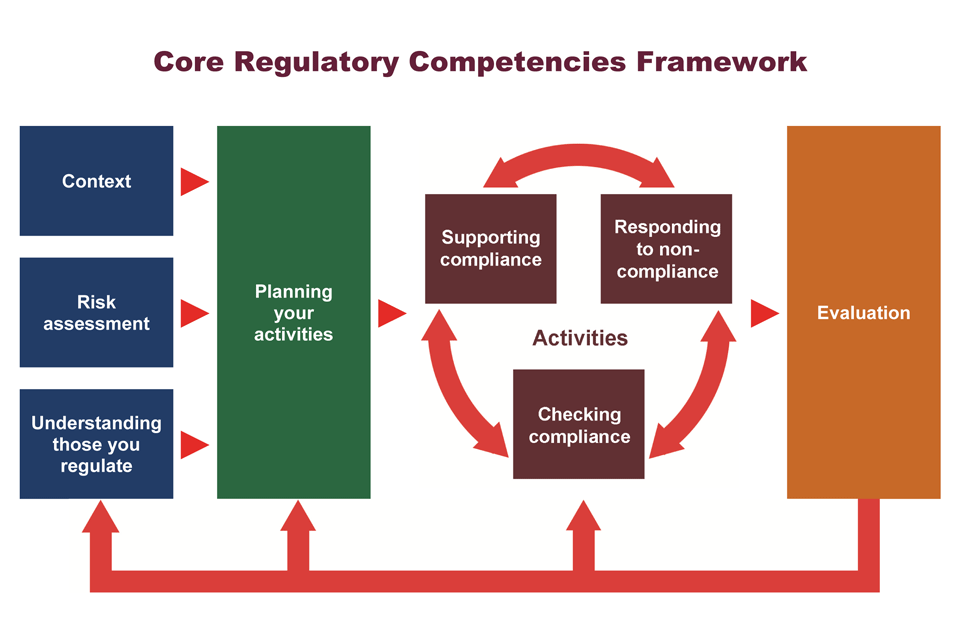Core competencies for regulators
Concise, principles-based core competencies for regulators and people training as regulators.
Effective local regulation depends upon the professionals involved. The regular review of their development needs is essential, as the nature of their roles, and the legislation they enforce, change over time. We think there is a set of core competencies relevant to all regulators, regardless of the level and specific nature of their work. However, their interpretation will vary: the workplace expectations in relation to regulators at the start of their careers and those with long experience are clearly very different.
Context
- Understanding of the role of regulation as a tool of Government
- Ability to work within the wider regulatory framework
- Ability to work towards your organisation’s regulatory objectives
- Ability to work with the legislation relevant to your regulatory function(s)
- Ability to work within your organisation’s regulatory policies and procedures
- Understanding of the role and responsibilities of partner organisations
Risk assessment
- Ability to assess regulatory risks
- Ability to gather, analyse, use and share data to inform risk assessment
- Ability to use risk assessment to guide your activities
- Understanding of risk management in a business context
(The term ‘business’ is used throughout to denote a regulated entity. Some regulated entities are not businesses but may, for example, be individuals acting in a private capacity. Many of the core competencies will apply equally in these cases.)
Understanding those you regulate
- Understanding of the current business environment and the business sector(s) regulated
- Understanding of how regulation and the way it is enforced can impact on the business communities and individual businesses regulated
- Understanding of the factors that affect business approaches to compliance
- Ability to engage constructively with business
- Ability to tailor your approach to businesses and individuals that you interact with
Planning your activities
- Ability to act within your role and area(s) of responsibility
- Ability to make appropriate intervention choices, drawing on your understanding of the context in which you operate, of those that you regulate, and of the use of risk-based approaches so as to have the greatest impact
- Ability to work effectively with other organisations
- Ability to plan your work, and that of your team, so as to deliver your responsibilities efficiently
(The reference to the officer’s team does not imply a ‘team leader’ role but recognises that officers within a team, or a group of officers delivering a project, may work collaboratively to plan activities.)
Checking compliance
- Ability to prepare appropriately for checks on compliance
- Ability to conduct checks in a proportionate manner
- Ability to be responsive to the circumstances encountered
- Ability to make informed assessments of compliance and risk
- Ability to follow-up on checks on compliance in an appropriate manner
Supporting compliance
- Understanding of the need for compliance support amongst those you regulate
- Ability to promote the importance of compliance, and your organisation’s role in supporting compliance
- Ability to communicate in appropriate ways to suit the circumstances
- Ability to provide the information and guidance that is needed by those you regulate
- Ability to provide the tailored advice that is needed by those you regulate, where appropriate
Responding to non-compliance
- Ability to select proportionate responses to non-compliance and potential non-compliance
- Ability to communicate effectively with businesses that have failed to comply
- Ability to conduct thorough investigations of non-compliance and allegations of non-compliance
- Ability to prepare and implement effective responses to non-compliance
- Ability to provide appropriate support for those adversely affected by non-compliance
Evaluation
- Ability to monitor and report on your activities and performance
- Ability to evaluate your activities in relation to your regulatory objectives and your organisation’s strategic priorities
- Understanding of the value of feedback from those you regulate, and the beneficiaries of regulation in informing future activities

The diagram shows the cyclical nature of the core regulatory competencies framework, moving from initial assessment through planning and activities to evaluation, which then underpins and informs the same sequence of work.